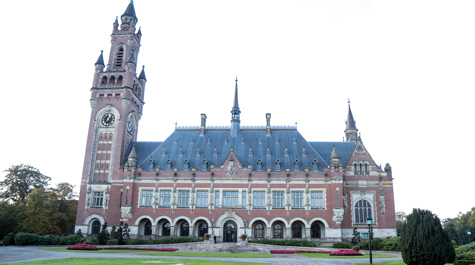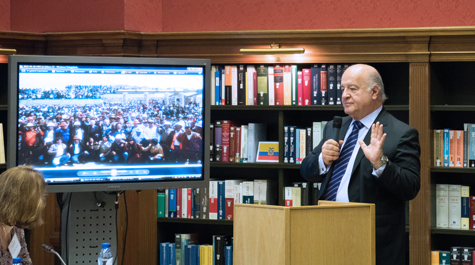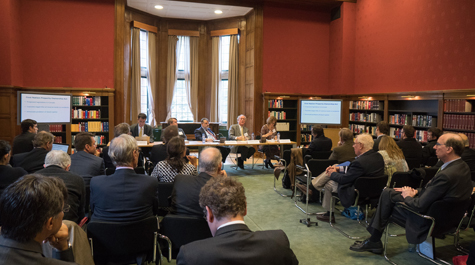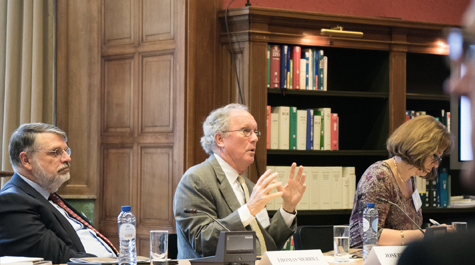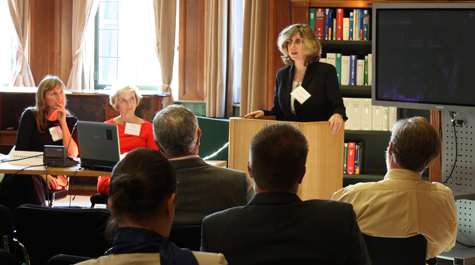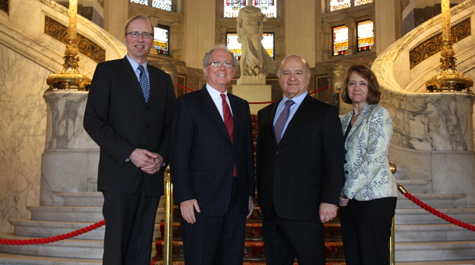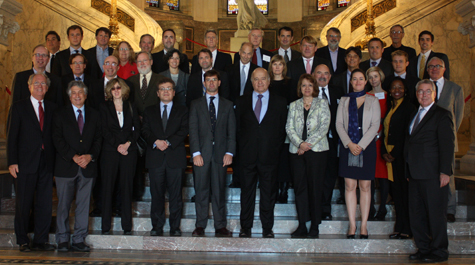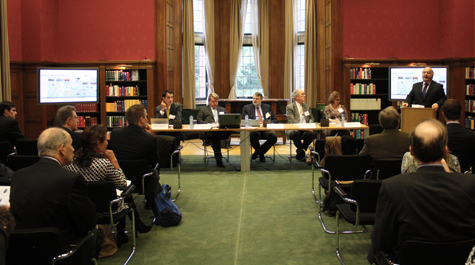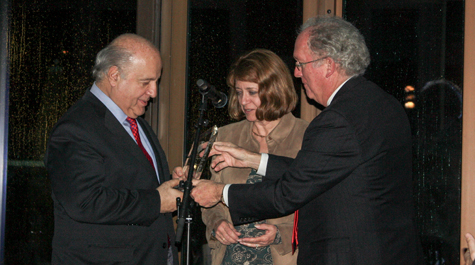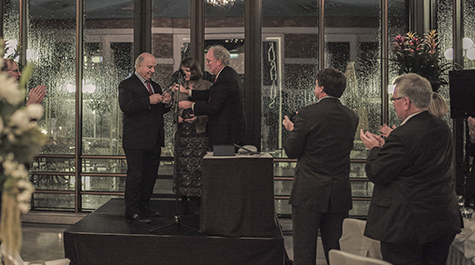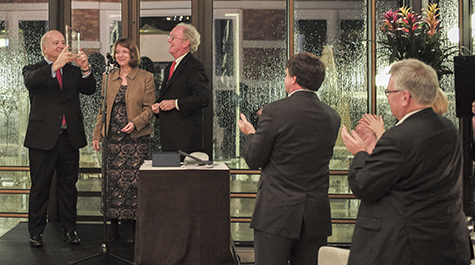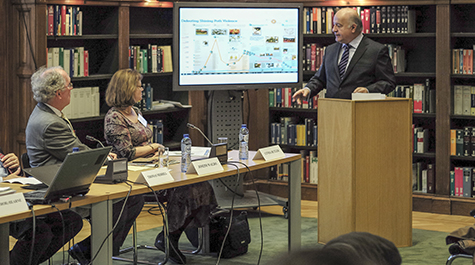Internationally Renowned Peruvian Economist de Soto Honored at 13th Property Rights Conference
The William & Mary Brigham-Kanner Property Rights Conference went international in October when it held its 13th annual program at the seat of the World Court, the Peace Palace in The Hague, Netherlands. During the three-day event, internationally renowned Peruvian economist Hernando de Soto was honored with the 2016 Brigham-Kanner Property Rights Prize.
De Soto, President of the Institute for Liberty and Democracy (ILD), headquartered in Lima, Peru, is recognized around the globe for his work in developing national economies and establishing private property rights especially for the impoverished.
Lynda Butler, Chancellor Professor of Law and Director of the William & Mary Property Rights Project, praised de Soto for demonstrating the significance of property rights for developing nations.
“Hernando has singlehandedly brought the world’s attention to the importance of property rights to the poor and to their informal economies,” Butler said. “Amazingly, his work appeals both to the left and to the right: the left because of his practical ideas for battling poverty and war through property rights and the right because of his innovative thinking about how to bring market capitalism and property rights to the poor.”
As the 2010 prize winner, Carol Rose of Yale Law School, further explained: “A particularly influential part of his work has focused on the benefits of formalizing previously informal land titles, and his writings have put a spotlight on the importance of institutional transparency for leveraging the market futures of property’s ownership.”
The conference, sponsored by the William & Mary Property Rights Project, was presented in cooperation with the Grotius Centre for International Legal Studies of Leiden University in The Hague. Designed to bring together members of the bench, bar, and academia to explore recent developments in the law that affect property rights, the conference provides outstanding panel discussions and encourages active participation from the audience.
De Soto is the author of The Mystery of Capital: Why Capitalism Triumphs in the West and Fails Everywhere Else (Basic Books, 2000), The Other Path: The Economic Answer to Terrorism (Basic Books, 2002), and Swiss Human Rights Book Volume 1: Realizing Property Rights (2006), co-authored with Francis Cheneval.
He has received numerous international honors, including, for example, the Adam Smith Award (Association of Private Enterprise Education), BearingPoint, Inc.-Forbes Magazine Compass Award for Strategic Direction, the CARE Canada Award for Outstanding Development Thinking, The Economist magazine’s Innovation Award, the Freedom Prize (Max Schmidheiny Foundation), and the Milton Friedman Prize for Advancing Liberty (Cato Institute).
Time magazine named de Soto one of the five leading Latin American innovators of the century in 1999, and included him among its list of the 100 most influential people in the world in 2004. Forbes Magazine in 2002 listed de Soto as one of the 15 people “who will reinvent your future.” Former U.S. President Bill Clinton called him “probably the world’s most important living economist,” and described the ILD’s work as the “most promising anti-poverty initiative in the world.”
The Brigham-Kanner Property Rights Prize is named in honor of Toby Prince Brigham and Gideon Kanner for their lifelong contributions to protecting private property rights, and is presented annually to a scholar, practitioner, or jurist whose work affirms the fundamental importance of property rights to individual liberty.
Reminding conference attendees that he is not a lawyer, and has never taught a course in his life, de Soto nevertheless appreciated recognition from academia, and looked forward to future collaboration.
“The ILD is not a think tank, but an action tank,” de Soto said. “But being here is a way that we can, one way or another, get close.” Throughout the conference, de Soto identified ways to link his “action tank” with members of the property rights academe and bar.
Conference Co-Chairman Joseph T. Waldo, a 1978 graduate of William & Mary Law School, and founding partner of Waldo & Lyle in Norfolk, Va., praised the value of de Soto’s writings for practitioners across the globe.
“As a practitioner in Virginia, like many other property rights lawyers around the nation, I represent individuals, small businesses, homeowners, and farmers whose property is taken,” Waldo said. “In the courts where cases are decided and law is made , having great writing and important articles is very helpful in convincing judges when we deal with takings cases each day.”
The 13th annual event was William & Mary Law School’s second international property rights conference; the first being held in Beijing in 2011. A number of William & Mary Law faculty made the trip with Butler, including Davison Douglas, Dean and Arthur B. Hanson Professor of Law; Nancy Combs, Ernest W. Goodrich Professor of Law; Eric Kades, Thomas Jefferson Professor of Law; and James Y. Stern, Associate Professor.
Panels included a wide range of topics, from an opening roundtable honoring de Soto to sessions on “Property’s Role in the Fundamental Political Structure of Nations,” “Property, Equality, and Freedom,” “Rising Seas and Private Property,” and others.
Prior recipients of the Brigham-Kanner Prize include Professor Frank I. Michelman, Harvard Law School (2004); Professor Richard A. Epstein, University of Chicago Law School (2005); Professor James W. Ely, Jr., Vanderbilt Law School (2006); Professor Margaret Jane Radin, University of Michigan Law School (2007); Professor Robert C. Ellickson, Yale University (2008); Professor Richard E. Pipes, Harvard University (2009); Professor Carol Rose, University of Arizona (2010); Retired Associate Justice of the United States Supreme Court Sandra Day O’Connor (2011); Professor James E. Krier, University of Michigan (2012); Professor Thomas W. Merrill, Columbia Law School (2013); Michael M. Berger of Manatt, Phelps & Phillips (2014); and Joseph William Singer, Harvard Law School (2015).
The 14th annual conference will return to William & Mary Law School in October 2017.
About William & Mary Law School
Thomas Jefferson founded William & Mary Law School in 1779 to train leaders for the new nation. Now in its third century, America's oldest law school continues its historic mission of educating citizen lawyers who are prepared both to lead and to serve.
